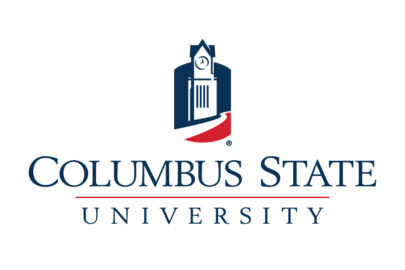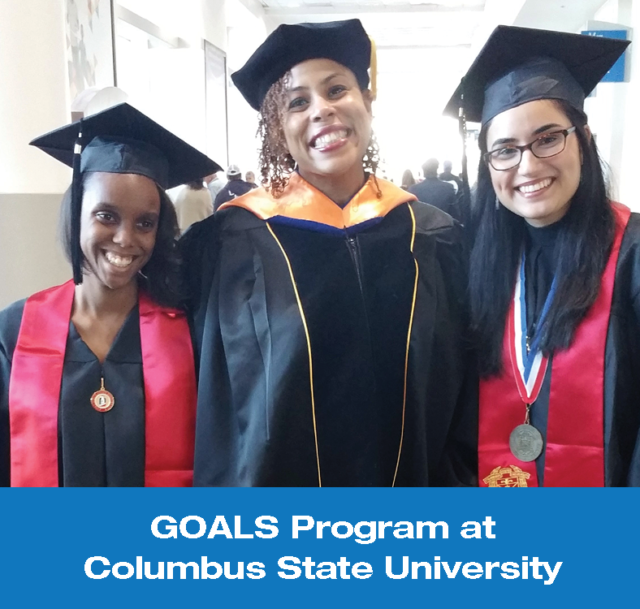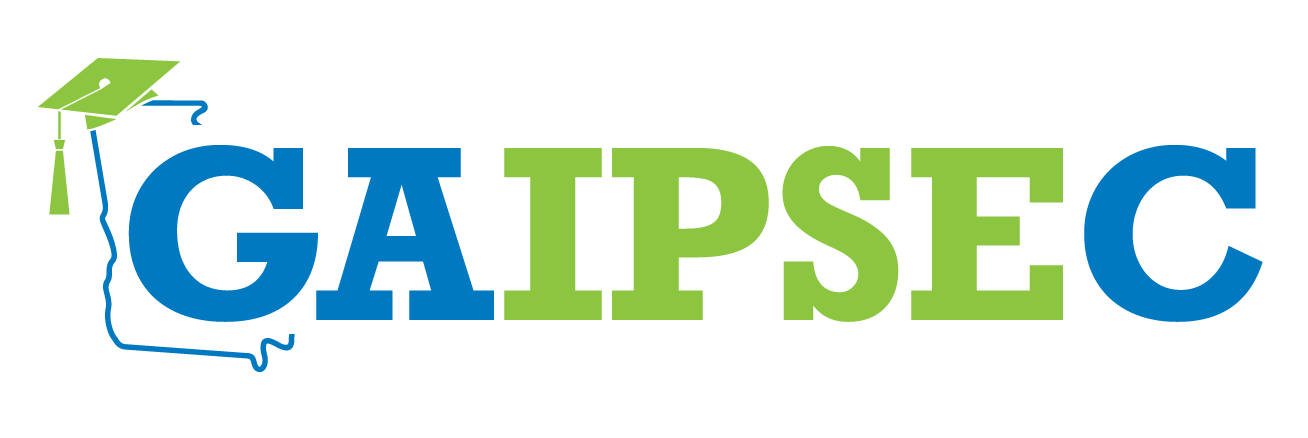Thomas Harkins finds his academic pursuits keep him very busy. “My first class is at 12 o’clock all the way until 12:50. Then my last class is at 2:00 all the way until 2:50. And then after that, I have my tutoring session. So, I usually get home at around five, maybe six o’clock in the evening,” Harkins explains.
In addition, he works in University Mail Center, earning an income while being part of a team. His supervisor notes that Harkins is ready to work the moment he walks into the Center.
Harkins is a student at Columbus State University’s (CSU) GOALS program.
 “GOALS stands for Guidance and Opportunities for Academic and Leadership Success, and I think that really nails what we’re all about,” says Dr. Gregory Blalock, associate professor of special education in the College of Education and Health Professions. Blalock started GOALS in 2008.
“GOALS stands for Guidance and Opportunities for Academic and Leadership Success, and I think that really nails what we’re all about,” says Dr. Gregory Blalock, associate professor of special education in the College of Education and Health Professions. Blalock started GOALS in 2008.
As an inclusive post-secondary education program, or IPSE, GOALS provides guidance to students with intellectual disabilities, and the opportunity to attend college. “It was an opportunity that just a few short years ago, didn’t exist for a fairly large segment of the developmental disability population who wanted to go to college and could benefit from college,” he added.
College for a person with intellectual (ID) in the GOALS Program gives them the same experience as students without disabilities. “It looks like any college student going to class. And even if some students require additional supports, we try to use natural supports, such as other students in the class,” says Dr. Toni Franklin, Assistant Professor of Special Education in the Teaching, Leadership, and Counseling Department.
Eight universities and one technical college in Georgia offer programs to assist individuals with ID in their pursuit of higher education. Together, they are a part of the Georgia Inclusive Post-Secondary Consortium (GAIPSEC) which includes partners such as the Georgia Council on Developmental Disabilities (GCDD) and the Center for Leadership in Disability.
“We provide guidance for individuals who would not typically have the opportunity to attend college. We give them the college experience while providing guidance to enhance their academic skills, their leadership skills, and occupational skills,” says Franklin.
 The GOALS Program at CSU represents an inclusive college program built upon the four principles of personal advocacy, career development, health education, and civic engagement. Students complete 36 credit hours of inclusive and program-specific courses, along with inclusive work-related internships that are designed to support the academic and personal leadership development of students.
The GOALS Program at CSU represents an inclusive college program built upon the four principles of personal advocacy, career development, health education, and civic engagement. Students complete 36 credit hours of inclusive and program-specific courses, along with inclusive work-related internships that are designed to support the academic and personal leadership development of students.
And the freshman experience is a natural rite of passage for any college students. They are overwhelmed with the huge campus, trying to make new friends, trying to figure out where classes are, and even trying to find out where they belong.
And eventually, they start to relax through the transition, and they become part of the student body, making Columbus State University their home away from home. “This is their campus, this is their home, this is their playground, this is their place of study. This is their place of work,” adds Blalock.
One of the most important aspects of breaking stereotypes for individuals with intellectual disabilities is providing the opportunity for them to live in society and be engaged in their community.
Peer mentors help in finding and engaging in those opportunities with the students. As with most IPSE programs in the state, the GOALS Program provides peer mentoring to support the academic and social development of everyone participating within the GOALS Program. Academic mentors provide academic tutoring and class support services designed to help GOALS students succeed. The Best Buddies at CSU chapter provides the foundation for GOALS students to develop authentic friendships with others from across campus.
“Outside of the academic area, my job is to look for different social events happening on main campus and try to get them involved,” says Lilly Patterson, peer mentor. “I work to increase the social interaction some of the students have during their days if they are working with me. It also just makes it kind of a meaningful experience on campus for them.”
One of the program’s challenges is the cost of tuition for students with ID. Many families did not begin saving for their child’s post-secondary education, as these programs are relatively new.
The cost of tuition and fees may seem prohibitive. “It’s a barrier that we need to focus on in order to increase the numbers in our program and in programs all over the state of Georgia,” added Franklin.
Those leading the program would like to see an increase in financial support and aid.
“Financial support would be extremely helpful to the students.” said Franklin. “Our students, just like any typical college student, have tuition fees. And many of these parents and these families were not aware of the opportunity to go to college, so they are not prepared. And in addition to that, a lot of these programs have additional fees for this extra support, so families really could benefit from any type of assistance they could.”
This past January, the Georgia Council on Developmental Disabilities hosted an IPSE Advocacy Day for which students across the state convened at the state Capitol to advocate to legislators for increased program funding and a new scholarship for student support. Specifically, advocates promoted support for HB 185, to create a state-funded scholarship like the HOPE Scholarship, for which IPSE students are currently not eligible.
Georgia’s HOPE Scholarship is available to Georgia residents who have demonstrated academic achievement. The scholarship provides money to assist students with a portion of the tuition cost at a HOPE Scholarship eligible college or university. By being available to IPSE students, a similar scholarship would ease access to college programs for Georgia students with ID, allowing students and parents to include college more easily in the planning of their child’s future. Currently, there are a few scholarships available to IPSE students, though they may be eligible for PELL grants.
The bill received a unanimous vote in Georgia’s House of Representatives, 165-0. At the time of this writing, it has passed out of the Senate Higher Ed committee and is waiting for a floor vote in the Senate. Then, because changes were made, it will need to return to the House for a vote.
Aside from getting a higher education and opportunity for employment, the intrinsic benefits of going to college are also there: making friends and lifelong networks, gainful employment, and being independent.
“I just do what I want to do, whenever I’m free. I hang out with my friend Daisy and she’s a good person. Sometimes I come to school on Mondays early around six or maybe seven. I go to the library until my class starts,” added Harkins.
“There is an increased level of self-determination,” adds Stephanie Marshall, former special education teacher and GOALS Program Coordinator. “They are the major player in their life in college. And I think that’s the goal here – we want them to be able to make their own choices once they leave here.”
Additionally, some GOALS students, like Harkins, are also employed on and off campus. Harkins works at the mail center while another student works at the local grocery store.
“There was a customer that came and I bagged his entire groceries,” added Khayla Johnson, a second year student at GOALS. “He gave me a whole $20 tip for just bagging groceries alone. It’s important to be friendly and nice to them because you never know if a customer comes in and they’re having a sad day and you want to cheer them up a little bit.”
The students also develop career experience. “They are working on a degree within a career field of their interest and they’re in a better position to be competitively employed by the time they graduate,” added Blalock.
“I feel when someone has interviewed me after a few times, and if they show me how to do something, I’ll be ready for the job by the week,” adds Johnson, confidently.
One of the positive unintended impacts of the program is on Columbus State University students who are working on their education degrees and their involvement and interaction of college students with ID. This helps in preparing these future teachers for their classrooms, for their students.
“I prepare teachers for K-12 schools, and special educators and otherwise,” adds Blalock, about his role at the university. “They have now been to a university where students with intellectual disabilities and other developmental disabilities have succeeded at the university. That has to impact you as a teacher. It has to affect the way that you provide the educational opportunities for a student. Because now, suddenly, you’re not looking at a fifth grader with Down Syndrome. You’re looking at a fifth grader with Down Syndrome, who’s now a potential college graduate.”
To learn more about GOALS at Columbus State University, visit their website.
To learn more about the Georgia’s nine IPSE Schools, visit the Georgia Inclusive Post-Secondary Consortium (GAIPSEC)

